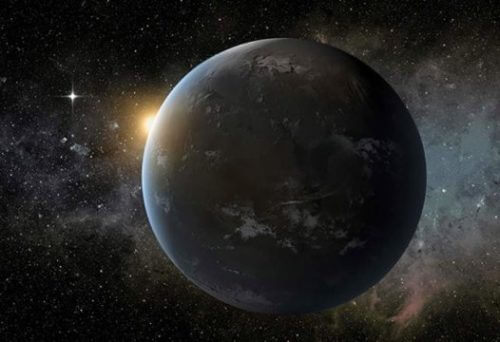In a study published in the Astrophysical Journal, the researchers wrote that the planet, which is 14 light-years away from us, is in the sitting region of its solar system

A team of researchers from San Francisco State University reveal in a new study details about the star Wolf 1061, which is 14 light-years from us, and hosts no less than three planets that are "super-Earths" - that is, planets outside our solar system that have a greater mass than Earth. But smaller than a gas giant like Jupiter or Saturn.
The star in question, a red dwarf, is one of our closest neighbors. Around the star Wolf 1061, also known as GJ628, revolve as mentioned three super-Earth stars, with one of them, Wolf 1061c, being in the system's accelerometer region - the region where suitable conditions exist for the existence of life similar to the conditions on Earth.
"The system of Wolf 1061 is important because it is so close, and it gives the possibility to do more follow-up studies to see if there is indeed life in this system," explained Dr. Stephen Kane in a study published in the Astrophysical Journal.
"Among other things, we measured the specific dimensions of the system, which are 0.3207 solar radii. We also have seven years of accurate and automatic photometry that reveals that the self-rotation of the star is 89.3 days." In addition, according to the researchers, the brightness of Wolf 1061 is 1% of that of our Sun, and the temperature on the star is about 3,032 degrees Celsius.
"When scientists look for planets that can nurture life, they are basically looking for a planet with almost identical characteristics to those of Earth," added researcher Kane. "Like Earth, that planet would have to be located in the specific region known as the 'habitable zone' where the exact conditions for life exist. In simple terms - this planet cannot be too close to the host planet nor too far. A planet that is too close will be too hot, and a planet that is too far away may be too cold and all the water on it will freeze, as happened on Mars."
Because Wolf 1061c is very close to the inner edge of the accretionary region, it may have an atmosphere similar to Venus. Scientists believe that Venus once had oceans, but the proximity to the sun gradually heated the planet until all the water evaporated, and the temperature on the planet rose because of this even more - and currently stands at about 470 degrees Celsius.
The researchers also noticed that the planet Wolf 1061c has more and faster changes in its orbit around its star, a fact that could indicate that the climate on the planet is quite chaotic. "This could mean that periods of extremes on the planet, such as ice ages or extreme warming, will be much more severe," explained Dr. Kane.
Although the researchers have not determined whether it is indeed possible that there is life on the planet in question, and claim that the findings so far prove at least one thing - we need to continue investigating this super-Earth, which is 14 light years away from us, to find out if life can exist on it.

5 תגובות
I agree with Chen's question
to conan
Your words remind me of the joke about the sergeant who wanted to brag about his "extreme" scientific knowledge.
in the ears of his soldiers. He asked them: "Who knows how many degrees there are in a right angle?" As usual, the redhead waved his finger and said the correct answer, 90 degrees. (The rest of the soldiers didn't dare to answer because they were afraid of the sergeant, that she would prepare some kind of cleverness for them, but Gingi is Gingi, he is not afraid of sergeants). Upon hearing the redhead's answer, the sergeant was a little embarrassed and thought for a minute, but immediately came to his senses and informed the department: "I'm going to find out about the matter, you are released for exactly 5 minutes!".
Exactly 5 minutes later, the department was waiting in the square in a tense line.
The major arrived and said to the platoon: "Dear soldiers, the redhead was right. In a right angle there are indeed exactly 90 degrees. But know this, water boils at 100 degrees."
Your words also, even if they are true, do not contradict and do not correct what was written in the article.
There are serious mistakes here:
The reason why there is no liquid water on the surface of Mars is that due to the lack of a magnetic field (unlike Earth), the "solar wind" dried it of water and also tore up its atmosphere.
As far as Venus is concerned - the reason for the high temperatures of its atmosphere is not due to its proximity to the sun but due to a deadly greenhouse effect due to the release of huge amounts of carbon dioxide vapor and sulfuric acid.
This is the temperature of the sun, not the planet
How is it similar to the Earth if the temperature in it is 3032 degrees Celsius??